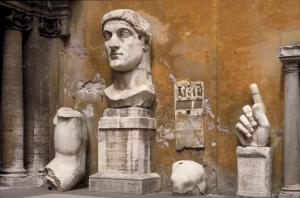
Christians used to know what it is like to live among the margins of society. Once, they had to deal with a semi-suspicious, semi-hostile government which considered them to be traitors to society. Governmental officials had Christians executed, thinking it would make Christians forsake their treachery and become good citizens of the empire. Many saw the situation as an opportunity; they used the rule of law to find ways to take property from the Christians and become wealthy at their expense. Many of those who benefited from the confiscation of Christian property were those who did not persecute the Christians themselves, but their heirs; because they were not directly responsible for what happened, they thought they did nothing wrong and so should be free to enjoy the wealth which they inherited. It is always the same; those not given basic rights or privileges in society find themselves constantly challenged by those in authority. Often, laws are made to subjugate them, making their very existence criminal. Christians experienced what so many Native Americans, African Americans, and Jews later would experience (often at the hands of Christians): that those with money and power want more, and they look for those in the margins of society as the means by which their desires can be fulfilled.
Christians, while they were suffering persecution, decried the injustices they faced. They wrote to governmental officials and authorities, telling them that they would be good and faithful citizens so long as they were not asked to do anything which went against their moral code. They would not sacrifice to the gods (or to Caesar). They would not engage in unjust warfare. They would not violate their conscience. They would rather die than be forced to betray themselves by violating their beliefs
Justice was important to Christians, and that meant, they not only asked the authorities to stop treating them so unjustly, they also asked to have what was taken from them to be returned. They understood justice should be restorative in nature (after all, was that not the message of the Gospel?). When Constantine gained power, their wish was fulfilled. Not only did he stop the persecution of Christians, he promoted reparations, starting with the notion that whatever property had been taken away from the Christians should be given back to them:
And we decree still further in regard to the Christians, that their places, in which they were formerly accustomed to assemble, and concerning which in the former letter sent to thy devotedness a different command was given, if it appear that any have bought them either from our treasury or from any other person, shall be restored to the said Christians, without demanding money or any other equivalent, with no delay or hesitation.[1]
Those who benefited from the persecutions, directly or indirectly, would have to pay back what they gained (though they could and would receive clemency if they received their wealth indirectly and if they were willing to divest themselves from such unjust gains):
And that there may be no obscurity in this our ordinance, but every one may readily apprehend its requirements, let all men hereby know that if they are now maintaining themselves in possession of a piece of land, or a house, or garden, or anything else which had appertained to the before-mentioned persons, it will be good and advantageous for them to acknowledge the fact, and make restitution with the least possible delay. On the other hand, although it should appear that some individuals have reaped abundant profits from this unjust possession, we do not consider that justice demands the restitution of such profits. They must, however, declare explicitly what amount of benefit they have thus derived, and from what sources, and entreat our pardon for this offense; in order that their past covetousness may in some measure be atoned for, and that the Supreme God may accept this compensation as a token of contrition, and be pleased graciously to pardon the sin. [2]
If, on the other hand, some would resist the reparations which Constantine demanded, and indeed, if they defended themselves and what they did, Constantine decreed that they would be punished due to the demands of justice:
But it is possible that those who have become masters of such property (if it be right or possible to allow them such a title) will assure us by way of apology for their conduct, that it was not in their power to abstain from this appropriation at a time when a spectacle of misery in all its forms everywhere met the view; when men were cruelly driven from their homes, slaughtered without mercy, thrust forth without remorse: when the confiscation of the property of innocent persons was a common thing, and when persecutions and property seizures were unceasing. If any defend their conduct by such reasons as these, and still persist in their avaricious temper, they shall be made sensible that such a course will bring punishment on themselves, and all the more because this correction of evil is the very characteristic of our service to the Supreme God. So that it will henceforth be dangerous to retain what dire necessity may in time past have compelled men to take; especially because it is in any case incumbent on us to discourage covetous desires, both by persuasion, and by warning examples. [3]
Constantine made it clear, what he demanded of others would also be demanded from the government; it, too, would divest itself from all its ill-begotten gains:
Nor shall the treasury itself, should it have any of the things we have spoken of, be permitted to keep them; but, without venturing as it were to raise its voice against the holy churches, it shall justly relinquish in their favor what it has for a time unjustly retained. We ordain, therefore, that all things whatsoever which shall appear righteously to belong to the churches, whether the property consist of houses or fields and gardens, or whatever the nature of it may be, shall be restored in their full value and integrity, and with undiminished right of possession. [4]
Such restitution, and the subsequent rights given to Christians, helped preserve Christianity and give it a central place in worldly affairs. It is hard to imagine how things would have been if Constantine did not come into power and if he had not promoted reparations. Obviously, many resisted Constantine, saying they were not responsible for what their ancestors had done, and so they should not be required to make any reparations. But the reason why he rejected their claims was simple: justice demanded the government to help those who have been unjustly burdened by the system, and those who benefited from systematic structures of sin must be expected to help those who have been hurt by those very structures. Christians used to understand this. They used to understand that justice had to be systematic and restorative. Christians used to understand the system could not and would not be deemed just so long as it was built upon past injustices and did nothing to rectify the harm it had done to the innocent. Christians used to understand reparations, for they benefited from them. Why, then, do American Christians, especially those who claim to be traditional, fight against reparations when dealing with the evils of racism? What has gone so wrong that Christians have lost their sense of justice? If Christians want to praise Constantine for what he did for them, if Christians want to look back to Constantine for all the good which he did, they should embrace that good and follow its dictates. While history does record many things he did badly, as he was far from perfect, he was recognized as great because of the way he transformed society and promoted, even if for a short while, a pluralistic society which made room for those who had been abused by the system by supporting and promoting reparations. Christians, having gained from reparations in the past, must now follow through and promote them today, to those who have unjustly suffered from the system in which they live in now. They must embrace restorative justice. Anything less, and they show themselves as turning back from the very justice which Jesus represents and which gave them a place in world history.
[1] This is from Constantine’s “Edict of Milan” as found in Eusebius, Church History in NPFN2(1):379.
[2]Constantine’s decree as recorded in Eusebius, Life of Constantine in NPFN2(1):509.
[3] Constantine’s decree as recorded in Eusebius, Life of Constantine, 509-10.
[4] Constantine’s decree as recorded in Eusebius, Life of Constantine, 510.
Stay in touch! Like A Little Bit of Nothing on Facebook.
If you liked what you read, please consider sharing it with your friends and family!












